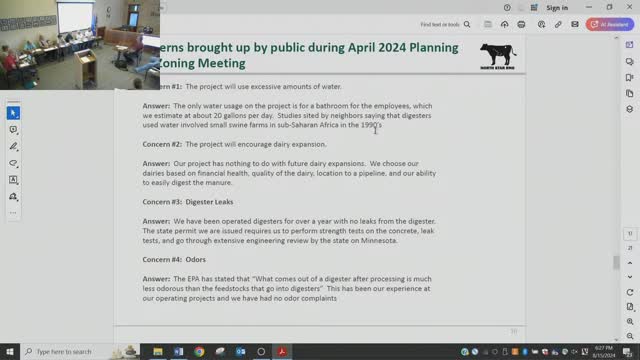Controversy erupts over dairy digester project plans
August 16, 2024 | Todd County, Minnesota
This article was created by AI summarizing key points discussed. AI makes mistakes, so for full details and context, please refer to the video of the full meeting. Please report any errors so we can fix them. Report an error »

In a recent government meeting, discussions centered around the operational details and regulatory compliance of a new manure digester project, which has faced scrutiny from local stakeholders. The project, designed to process manure from local dairy farms, has sparked an appeal questioning its environmental impact, particularly concerning water usage and potential leaks.
The project representatives clarified that the digester will not add water, countering claims made in the appeal that referenced unrelated studies from Sub-Saharan Africa. They emphasized that adding water would reduce the efficiency of the digestion process and increase operational costs. The digester is expected to handle approximately 147,000 gallons of manure daily, with a retention time of around 28 days, significantly reducing the volume of waste and making it easier for farmers to manage.
Concerns about the digester's potential to encourage dairy expansion were also addressed. Project leaders stated that their financial models are based solely on current herd counts and do not factor in anticipated expansions from farmers. They reiterated that the project is designed to improve manure management rather than drive increased dairy production.
Safety measures were a key focus, with assurances that the facility has been operating without leaks for over a year. The representatives detailed rigorous testing protocols mandated by state regulations, including strength and leak tests for the digester's concrete structure. They also outlined the safety controls in place to prevent gas leaks and explosions, including continuous monitoring and emergency response protocols.
The meeting concluded with discussions on the project's integration into the local natural gas pipeline system, with ongoing negotiations with CenterPoint Energy for potential gas sales. The representatives expressed optimism about the project's role in providing a reliable energy source while contributing to environmental sustainability efforts.
The project representatives clarified that the digester will not add water, countering claims made in the appeal that referenced unrelated studies from Sub-Saharan Africa. They emphasized that adding water would reduce the efficiency of the digestion process and increase operational costs. The digester is expected to handle approximately 147,000 gallons of manure daily, with a retention time of around 28 days, significantly reducing the volume of waste and making it easier for farmers to manage.
Concerns about the digester's potential to encourage dairy expansion were also addressed. Project leaders stated that their financial models are based solely on current herd counts and do not factor in anticipated expansions from farmers. They reiterated that the project is designed to improve manure management rather than drive increased dairy production.
Safety measures were a key focus, with assurances that the facility has been operating without leaks for over a year. The representatives detailed rigorous testing protocols mandated by state regulations, including strength and leak tests for the digester's concrete structure. They also outlined the safety controls in place to prevent gas leaks and explosions, including continuous monitoring and emergency response protocols.
The meeting concluded with discussions on the project's integration into the local natural gas pipeline system, with ongoing negotiations with CenterPoint Energy for potential gas sales. The representatives expressed optimism about the project's role in providing a reliable energy source while contributing to environmental sustainability efforts.
View full meeting
This article is based on a recent meeting—watch the full video and explore the complete transcript for deeper insights into the discussion.
View full meeting
